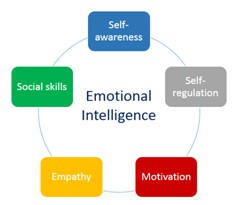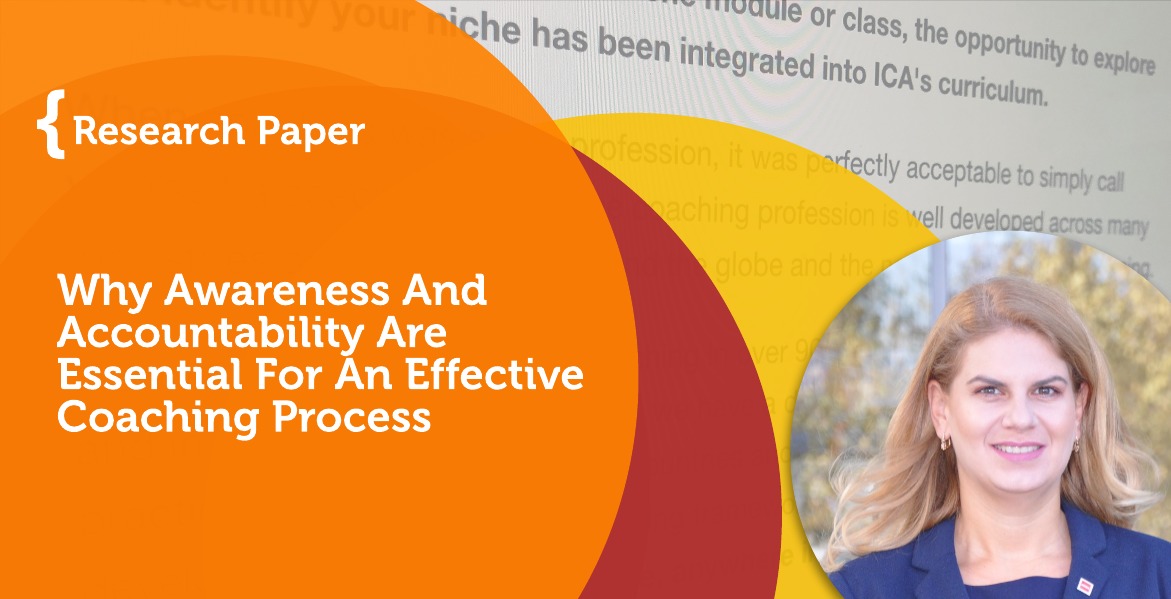Research Paper By Cristina Gutu
(Business/Career Coach, ROMANIA)

I am a qualified professional accountant. To me, taking a coaching qualification seemed like something I would never do. Until one day when I was given this amazing opportunity by my employer. I had experienced already the benefits of coaching from a coachee perspective, but I could never see myself on the other side .. being a coach that can help create a coaching culture in our organization and being there for my colleagues to help them grow. My first days at the coaching school were a mixture of AHA moments (moments of sudden realization, inspiration and motivation to learn as much as I can) and horror moments (observing my peers who seemed way more advanced, having the professional jargon on hand and the ability to jump right into practice immediately, felt very demotivating to me and almost made me gave up several times). Than… I said to myself that this is too good to give up and I have to find a structured approach to support me in the learning journey (this always works! – I guess it is driven by my accountant mind..). Everything so far has been a very rewarding and intensive learning experience, I came across a variety of concepts and ideas and, part of my reflections, I managed to identify two key elements that, in my opinion, would be the drivers for an effective coaching process. These are awareness and accountability. Why? This is what my research paper will focus on.
According to Cambridge Dictionary:
Awareness = knowledge that something exists, or understanding of a situation or subject at present based on information or experience.
Self-Awareness= good knowledge and judgment about yourself
Daniel Goleman, the well-known American psychologist, and writer of the international bestseller “Emotional Intelligence” consider self-awareness as the keystone of emotional intelligence.
Goleman considers five key elements comprise emotional intelligence:
Self-awareness
Knowing your own emotions will make you feel secure and will enable you to take your own decisions.
Self-regulation
Learning how to control and guide your emotions will enable you to adapt better to each situation. It can be summarized as “think before you act”
Motivation
This is key to efficiently achieving your goals. The ability to use your emotions on the path to achieving your goals enables productivity, personal growth and success
Empathy
Acknowledge the emotions of others will enable you to treat them according to their emotional reactions
Social skills
The ability to guide the emotions of others is the fundament for the effective building and managing of relationships

So, if I come back to self-awareness, knowing yourself as you are in the first step you can take in your journey towards growth and success.
Travis Bradberry & Jean Greaves use the onion metaphor to describe self-awareness in their Emotional Intelligence 2.0: “Getting to know yourself inside and out is a continuous journey of peeling back the layers of the onion and becoming more and more comfortable with what is in the middle – the true essence of you”
Why is self-awareness fundamental to coaching?
As coaches, we are there to support our clients to unleash, to unlock their true potential.
You cannot change what you are not aware of. So, supporting our clients becoming aware of their behaviors, seeing by themselves, on one hand, which of these behaviors are positive and useful for achieving their goals and, on the other hand, which are the negative behaviors that might stand in their way, is starting the journey well-equipped.
The fact that self-awareness is fundamental in coaching was also re-emphasized by a survey employed by global leadership development Korn Ferry. Korn Ferry surveyed more than 200 coaches from around the globe who are part of Korn Ferry’s coaching network—professionals who listen to, guide, and counsel thousands of senior leaders. Self-awareness was the number one topic that coaches worked on with CEOs.
Practical ways to support the client become more self-aware
Using powerful questions
Being able to ask the right question at the right time is one of the key skills in coaching. This is because a relevant question enables the client to stop, think from a different perspective, and triggers a new awareness.
Here are some examples of powerful questions that created lots of A-HA moments for both my clients and myself:
Through questions, a coach can hold up a mirror in front of their client. Standing in front of a mirror represents a very powerful step towards becoming more self-aware. Then, coming back to the onion metaphor.. for the coaching process to be truly effective, you must support your client going beyond the surface he can see in this mirror and discovering what is really beyond the surface.
Observation and feedback
This quote from the ICA support document Creating Awareness was a true eye-opener in my coaching journey:
“Another way coaches can create awareness with a client is through the use of feedback. Feedback is an observation. It is information that we have noticed, discerned, or are picking up from what they are saying. The difference between feedback and advice is that feedback is nonjudgmental. It is not based on opinion nor beliefs but rather on the moment of observation. Feedback never includes the words “you should”. Feedback helps the client to realize that your listening is complete and real.”
Here, as a coach, you can give life to the mirror. Offering feedback to our clients, without judging, is about mirroring back to them the way we see it from the other side.
Helping the clients become more open to feedback and leaving their fears (of criticism, of being judged, etc.) aside is a very powerful tool for increasing their self-awareness. Many times in my coaching conversations I come across clients who say: “ Others always see me…” , “No matter what I do, my colleagues think of me..” etc. This type of attitude is nothing else than an obstacle in the journey of reaching their goals. So, I learned together with my clients, while exploring the options they have to get a clear image from their teams/ peers/ leaders, etc., that a 360 anonymous feedback exercise is a very precious tool as it gives you the chance to discover perspectives that otherwise you would not have the chance to discover.
Now, that we saw how awareness is an essential starting point in the coaching process, let’s also focus on the second driver: accountability. In my opinion, without creating accountability together with your client, the coaching process would not end effectively.
According to Cambridge Dictionary:
Accountability = the fact of being responsible for what you do and able to give a satisfactory reason for it, or the degree to which this happens
Once you support your clients in designing their goals, objectives, and actions to reach them, it is fundamental that you continue to stand by them and support them in achieving success by holding them accountable for their actions. Ensuring that they DO what they said they WOULD DO completes an effective coaching process
Powerful questions are again a very useful technique of creating accountability for your clients. Here are a few examples:
In summary, if I were to ask myself what kind of coach I would like to be, I would probably answer the coach that starts the journey with supporting the clients building and increasing self-awareness and completes this journey holding them accountable for getting things done, meeting their deadlines and achieving the goals they set to themselves. And definitely, the coach who does not forget to acknowledge and celebrate success with his clients!
References:
https://dictionary.cambridge.org
Goleman, Daniel (1995). Emotional Intelligence
Bradberry, Travis; Greaves, Jean; Lencioni, Patrick (2009) Emotional Intelligence 2.0
ICA learning support documents
